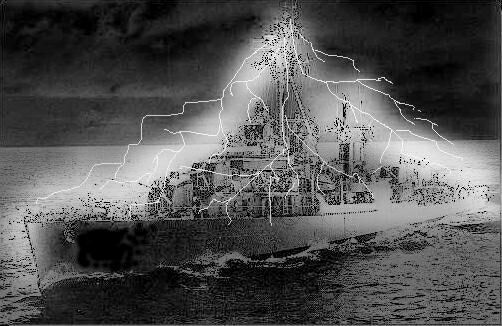Invisible Sailors and a Bar-Room Brawl
by Nick Redfern January 24, 2018 (mysteriousuniverse.org)
-
The infamous “The Philadelphia Experiment” came from a man named Carlos Allende who claimed that, in 1943, the Navy was doing (cloaking) experiments based on Einstein’s Unified Field Theory, and accidentally transported the Navy ship, the USS Eldridge, from the Philadelphia Naval Shipyard to a Norfolk shipyard, and back again. Allende claims that while he was in the Navy during WWII he witnessed several such experiments. The Navy didn’t deny these experiments.
-
An investigator named Bill Moore claims to have seen a newspaper article about an occurrence that happened at the same time. There was a brawl involving sailors at a local bar. The Navy Shore Patrol arrived to break it up. When local police arrived to back up the Shore Patrol, the bar was empty. A waitress told the police that two of the sailors in the brawl had simply disappeared in the bar. “They just sort of vanished into thin air… right there,” reported a frightened hostess, “and I ain’t been drinking either!”
-
Six years later, an unassociated Navy man was told the story of a “bunch of sailors” who had mysteriously vanished from a bar somewhere near the Philadelphia Naval Shipyard. But this occurred prior to the ‘Philadelphia Experiment’s’ public disclosure in the mid-1950’s.
-
[Editor’s Note] There is a lot more to the story. The sailors aboard the USS Eldridge were disoriented and some were encapsulated in the bulkhead of the ship due to shifting time-space. A time-space window would cause further anomalies at twenty-year intervals. Two of the Eldridge sailors were brothers Duncan and Ed Cameron. Ed changed his name to Al Bielek and claimed to have time-traveld on several occasions as a result of this incident. Bielek died in 2011. Duncan Cameron remains a prominent figure in the disclosure movement.
Just like the Roswell saga of 1947, the 1967 Patterson-Gimlin film of a Bigfoot (or of a man in a suit, depending on your opinion), and the theory that the Moon-landings were faked, just about everyone has heard of what has become infamously known as “The Philadelphia Experiment.”
According to the wild claims of a man named Carlos Allende (told to writer Morris K. Jessup in the mid-1950s) in 1943, and during a classified project, a ship was made invisible and teleported from the Philadelphia Naval Shipyard to Norfolk, Virginia. And back again. It was all said to have been an outgrowth of Albert Einstein’s Unified Field Theory. Allende claimed the ship in question was the DE 173 USS Eldridge. Allende didn’t stop there: he said he saw one of several such experiments from the safety of his own ship, the SS Andrew Furuseth. Few researchers today have much time for Allende’s stories.
No one disputes that something led to the creation of the legend of the vanishing ship and its crew. Indeed, even the U.S. Navy admits that some of its wartime experiments may have provoked a number of the rumors. There is one aspect of the story that often pops up in conversations of the Philadelphia Experiment kind, mainly because it’s so entertainingly weird.

Investigator Bill Moore (who, in 1979 and with Charles Berlitz, wrote The Philadelphia Experiment) revealed a strange story extracted from a newspaper that has still yet to be identified. It described the sudden vanishing – and I do mean vanishing, as in here one second and gone the next – of a number of sailors in a local pub.
With the eye-catching headline of “Strange Circumstances Surround Tavern Brawl,” the story went as follows:
“Several city police officers responding to a call to aid members of the Navy Shore Patrol in breaking up a tavern brawl near the U.S. Navy docks here last night got something of a surprise when they arrived on the scene to find the place empty of customers. According to a pair of very nervous waitresses, the Shore Patrol had arrived first and cleared the place out -but not before two of the sailors involved allegedly did a disappearing act. ‘They just sort of vanished into thin air… right there,’ reported one of the frightened hostesses, ‘and I ain’t been drinking either!’ At that point, according to her account, the Shore Patrol proceeded to hustle everybody out of the place in short order.”
The story continued: “A subsequent chat with the local police precinct left no doubts as to the fact that some sort of general brawl had indeed occurred in the vicinity of the dockyards at about eleven o’clock last night, but neither confirmation nor denial of the stranger aspects of the story could be immediately obtained. One reported witness succinctly summed up the affair by dismissing it as nothing more than ‘a lot of hooey from them daffy dames down there,’ who, he went on to say, were probably just looking for some free publicity. Damage to the tavern was estimated to be in the vicinity of six hundred dollars.”
Moore and Berlitz’s assessment was that: “Little else can be said about the clipping itself. Anything approaching a proper analysis of the clipping is impossible, since the authors possess a photocopy only. Upon close examination, however, the possibly significant fact emerges that the column width is a bit greater than was used by any of the Philadelphia dailies in the 1940s. This suggests that the article may have originated in a local or regional newspaper in the Philadelphia area rather than in one of the metropolitan papers.”
FAIR USE NOTICE: This page contains copyrighted material the use of which has not been specifically authorized by the copyright owner. ExoNews.org distributes this material for the purpose of news reporting, educational research, comment and criticism, constituting Fair Use under 17 U.S.C § 107. Please contact the Editor at ExoNews with any copyright issue.
